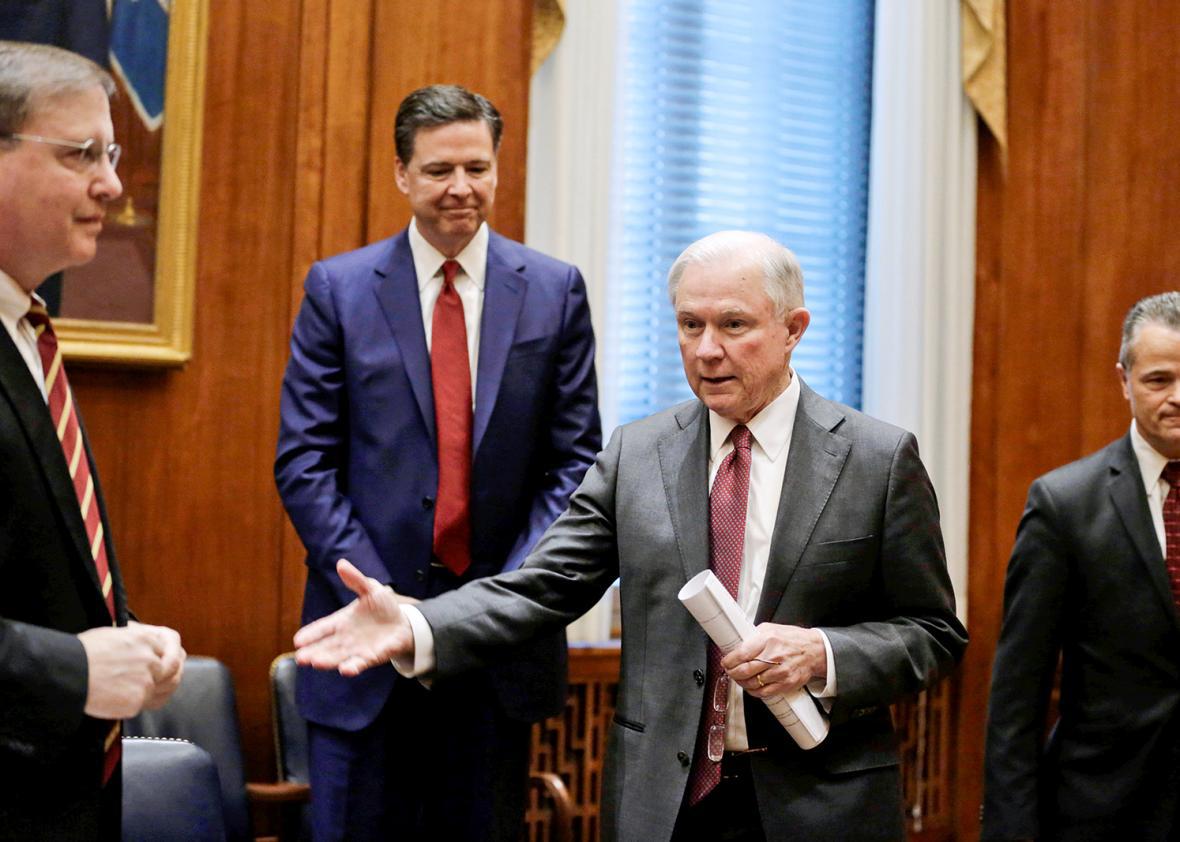“We have the most remarkable, wonderful legal system the world has ever known. I truly believe that,” said Attorney General Jeff Sessions on Tuesday in his first major speech as the nation’s most powerful law enforcement official.
Sessions was speaking to a room full of state prosecutors, who are gathered this week in Washington for the winter meeting of the National Association of Attorneys General. His comment about our “wonderful” legal system, though likely meant as a throwaway pat on the back for his audience, came across as a declaration of first principles. This Justice Department, Sessions seemed to be saying, does not believe there’s anything’s wrong with holding 2.2 million people behind bars, and it will not support the bipartisan consensus that the American justice system requires urgent reform.
Throughout his speech, Sessions asserted that the United States is in the throes of a nationwide crime wave that is only getting started—a bit of politically useful speculation based on recent spikes in violent crime that have destabilized some of the country’s major cities. After noting that murders nationwide went up by 10.8 percent in 2015, Sessions expressed his belief that the problem will keep getting worse unless something is done about it. “It’s lots of this out there that’s driving a sense that we’re in danger,” he said, expressing with perhaps more vividness than he intended just how vague and disconnected from reality that “sense” of danger really is.
Sessions takes no comfort in the fact that crime in the country remains near historic lows or that experts on crime statistics have cautioned against jumping to conclusions based on the data for one year. “Maybe I’m wrong,” Sessions said, “but I do not believe that this pop in crime, this increase in crime, is necessarily an aberration, a one-time blip.”
With the exception of “maybe I’m wrong,” Sessions’ message echoed one of the central motifs of Donald Trump’s presidential campaign—that the United States is being destroyed from within by dangerous criminals, and that a failure to act will usher in a return of the bad old 1970s and ’80s. “At this point in history, I sense that we could be at a pivotal time,” Sessions said. “I sense that if we take the right actions now, affirm good, effective, proven law enforcement techniques, we can avoid another long-term surge in crime rates in America.” In his prepared remarks, which he mostly set aside in favor of improvisation, Sessions compared the 2015 crime data to “the first gusts of wind before a summer storm.”
What the new attorney general failed to say is that crime rates, like day-to-day weather patterns, are best understood as a local phenomenon. A 10.8 percent increase in murder nationwide tells us no more about how to solve the nation’s crime problems than today’s temperature in Los Angeles tells us about whether New Yorkers should be wearing their winter coats. Although he assured state prosecutors on Tuesday that he believes in local enforcement, Sessions betrayed no appreciation for the argument that ending gun violence in Chicago is a separate and different task than bringing down the murder rate in Baltimore.
Instead, he outlined two main ideas for how to beat back what he sees a looming national crime wave. First, wage a new war on drugs: “My view is that crime does follow drugs,” he said, before suggesting that allowing legal marijuana to be sold “at every corner grocery” store would lead to more violent crime. Second, reduce the DOJ’s scrutiny of police misconduct, which will raise the morale of the nation’s law enforcement officers. “We need, so far as we can, in my view, to help police departments get better, not diminish their effectiveness,” Sessions said. “And I’m afraid we’ve done some of that. So we’re going to try to pull back on this, and I don’t think it’s wrong or mean or insensitive to civil rights or human rights.”
As he made this promise, Sessions spoke in his typically mild tone of voice and made a point, it seemed, of glazing his assertions with a layer of humility and tentativeness. Despite his hedging, those who fear the new attorney general’s agenda heard a man fully resolved to undo the efforts made by his predecessors to reverse mass incarceration and reduce police violence. The prosecutors in the room could also hear him loud and clear: With Jeff Sessions at the controls, our wonderful justice system is going to get even more wonderful.
